Grow Your Church
Without Burning Out
Join over 5,000 church leaders who use Simple Systems to build, grow, and sustain impactful ministries.


Discover Your Church Growth Potential
Take our 2-minute assessment to get a personalized roadmap for growing your church without burning out

Identify Growth Barriers
Discover what's holding your church back from its next level

Get Custom Recommendations
Receive tailored strategies based on your specific situation

Create Your Action Plan
Get a step-by-step roadmap to implement immediately
✓ Takes less than 2 minutes ✓ Completely free ✓ Instant results
This Week's Strategy Brief
Get the latest church growth insights and actionable strategies
Apostolic Insight with Henry Tolbert
Step-by-step frameworks to help you lead into a new future.
100,000+ Views Across All Platforms | 96% Likes This Video
This Week's Strategy Brief
Get the latest church growth insights and actionable strategies
Apostolic Insight with Henry Tolbert
Step-by-step frameworks to help you lead into a new future.
100,000+ Views Across All Platforms | 96% Likes This Video
Choose Your Growth Path
Whether you need systems or coaching, we have the perfect solution for your church
Church Systems in a Box
One Payment of $997
Perfect for Pastors Who Need Quick Wins on a Tight Budget
⚙️ All Systems Templates
⚙️ Church Job Descriptions and SOPs
⚙️ Monthly Coaching Call Access
⚙️ Lifetime Access
Free Bonus: ⚙️ Website Builder + CRM
Church Growth Accelerator
$7500/yr
or Flexible Payment Options
For Pastors Serious About Breakthrough and Rapid Growth
⚙️ 90-Day Intensive Program Designed to Install the 5 Core Church Systems
⚙️ Weekly Strategy Calls with Henry and the Accelerator Cohort
⚙️ Done-For-You Automation Setup and Systems Implementation
⚙️ Custom 90-Day Growth Plan and Accountability Tracker
⚙️ Leadership Development Toolkit for Staff and Volunteers
⚙️ Priority Access to All Templates, SOPs, and Funnels
⚙️ Access to “Accelerator Clinics” for Hands-On Problem Solving
⚙️ Personalized Strategy Review Optimization
⚙️ Exclusive Voxer Community of Growth-Minded Pastors with Instsnt Access to Henry
Free Bonus:
⚙️ Full Church Hub Setup (CRM, Website, Funnels, Emails, Text Automations)
⚙️ 12-Month Access to the Systems Library and All Future Updates
Why It Works
Built by pastors. Powered by systems. Proven to grow churches of every size.

Pastor-Built
Created by pastors who understand the unique challenges of church leadership

System-Powered
Automated workflows that free you to focus on ministry, not administration

Proven Results
Trusted by 100+ churches across the U.S. with measurable growth outcomes
"Simple Systems transformed our church. We went from a disengaged group to a healthy team. My vision has opened so much because I have room to think."
Free Resources
Get started with these proven tools and strategies - completely free
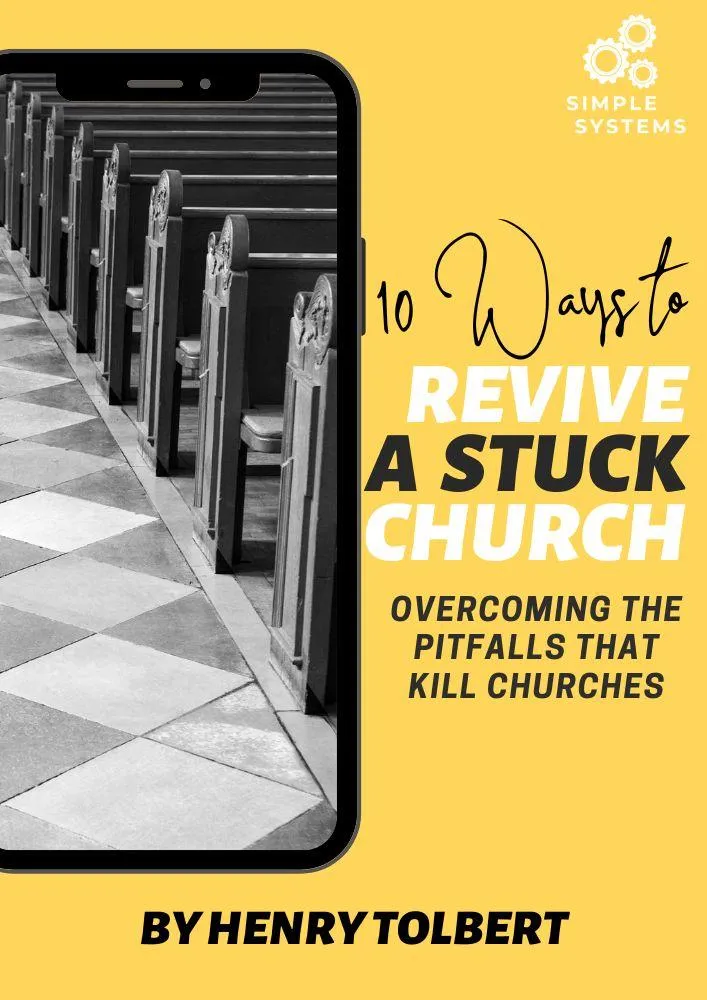
10 Ways to Revive a Stuck Church: Overcoming the Past to Reach the Future
Free eBook

The Church Growth Blueprint: Transforming Lives One Invitation at a Time
Free eBook
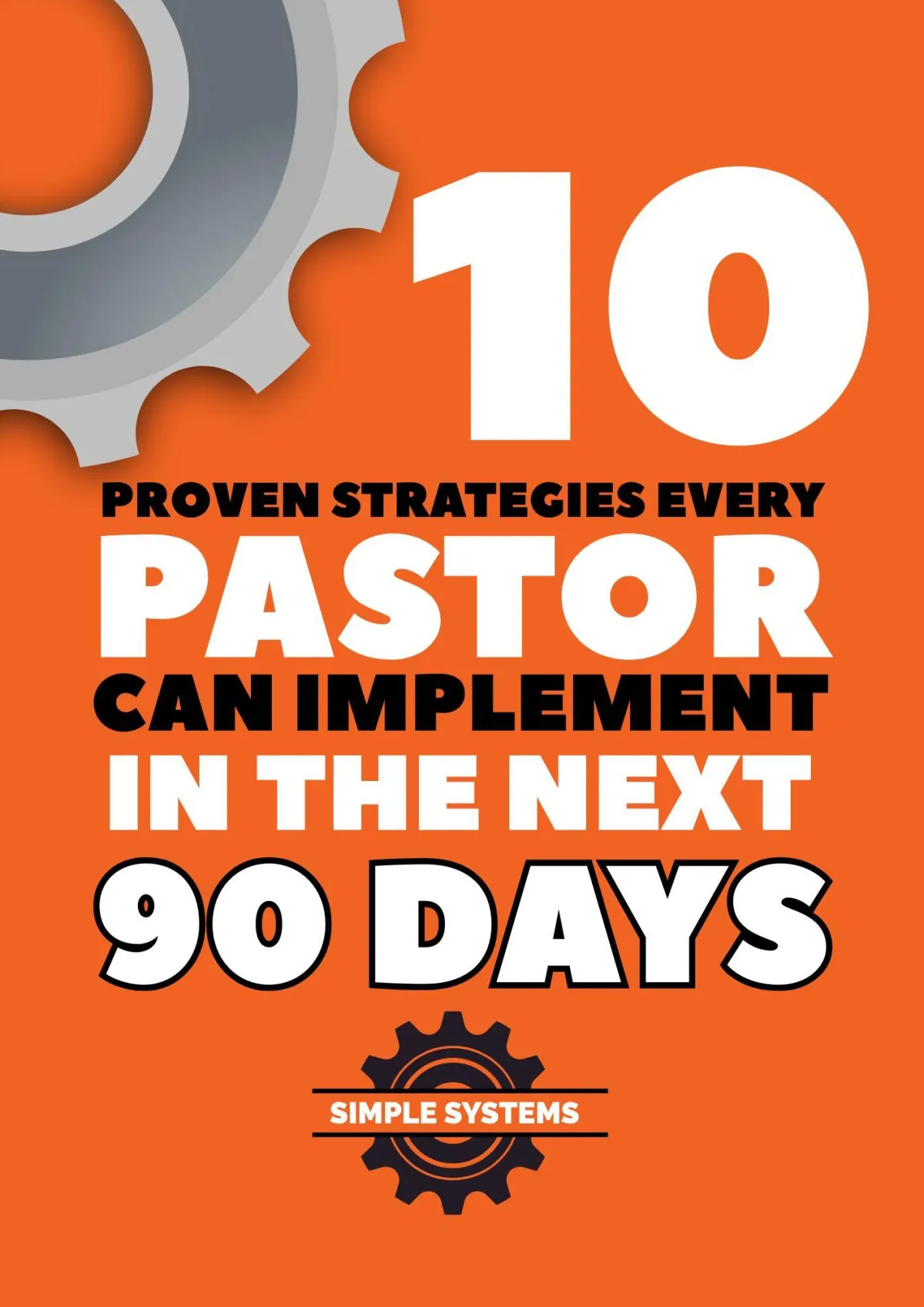
10 Proven Strategies Every Pastor Can Implement in the Next 90 Days!
Free eBook
Want to Get a Win in 1 Hour?
Quick, actionable courses that deliver immediate results for your ministry
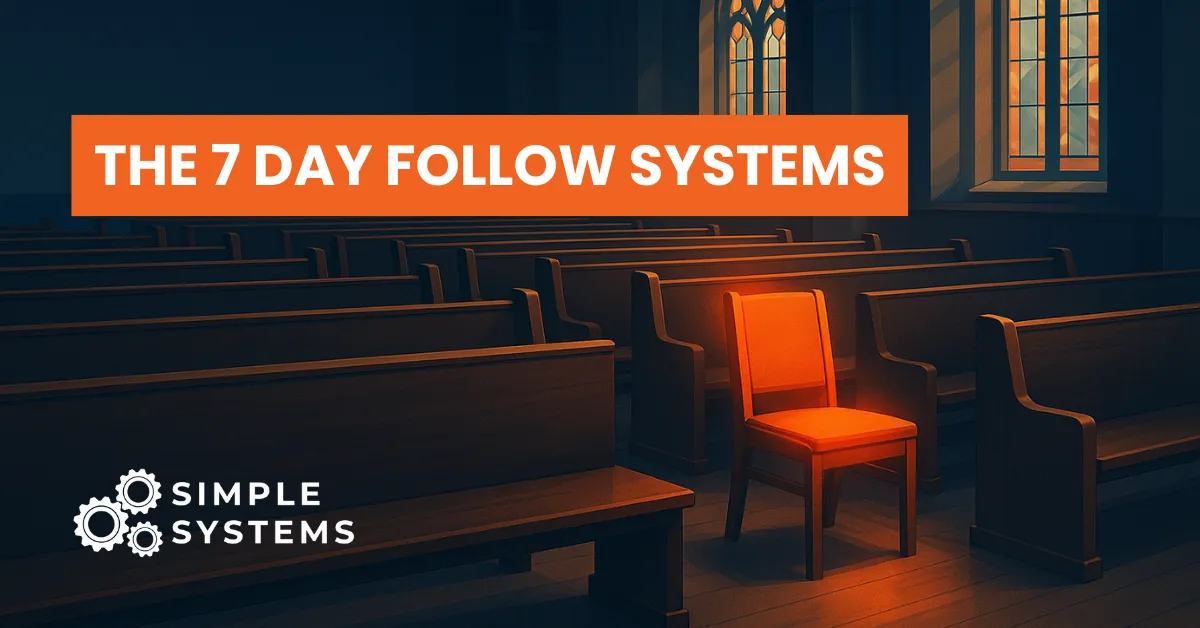
The 7- Day Guest Followup System
$19
45 minutes
Turn first-time visitors into committed members with our proven follow-up system.
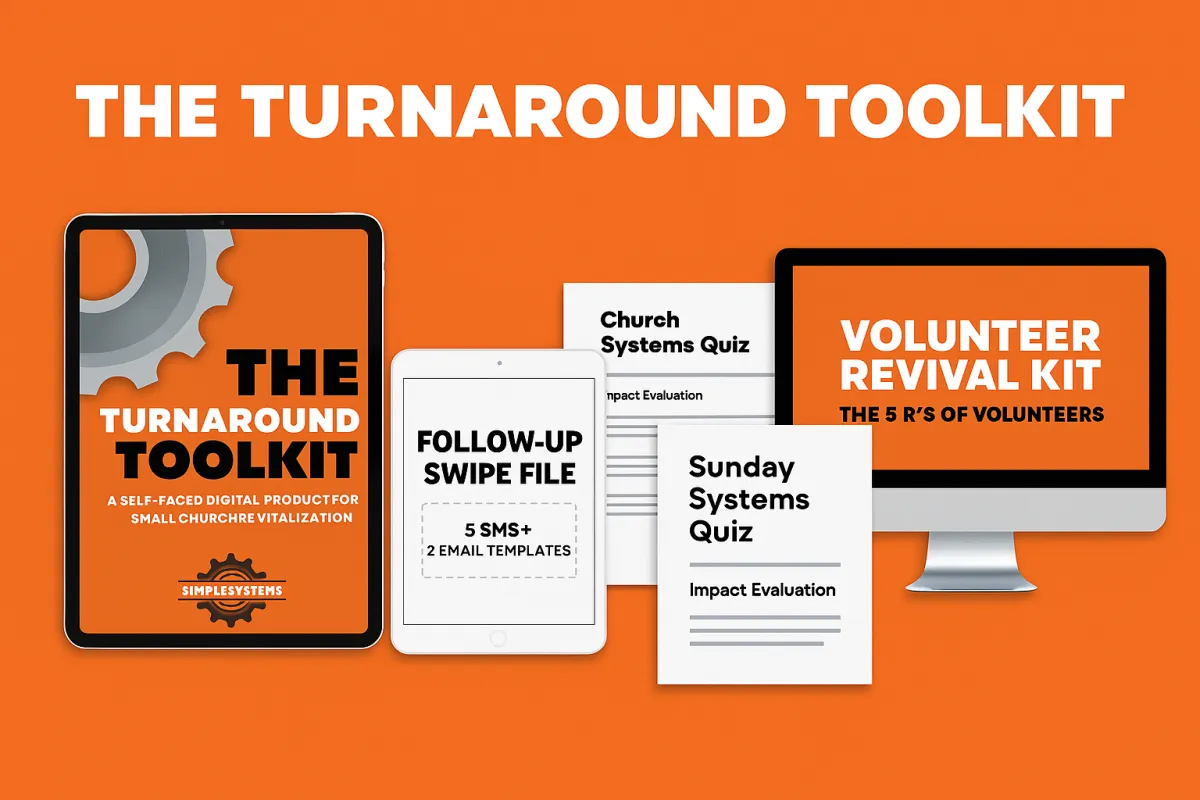
The Turnaround Toolkit Bundle
$47
90 minutes
If your church feels stuck, here's the systems-based toolkit pastors are quietly using to turn things around—fast.
Watch & Learn
Free training videos to help you grow your church with proven systems
How to Break the 100 Barrier
Why Your Church Isn't Growing (And How to Fix It)
The Death of the Small Black Church?
7 Shifts That Will Shake the Black Church
The Three Walls That You Must Overcome to Walk in Victory
Apostolic Insight | What is a Healthy Church in 2025
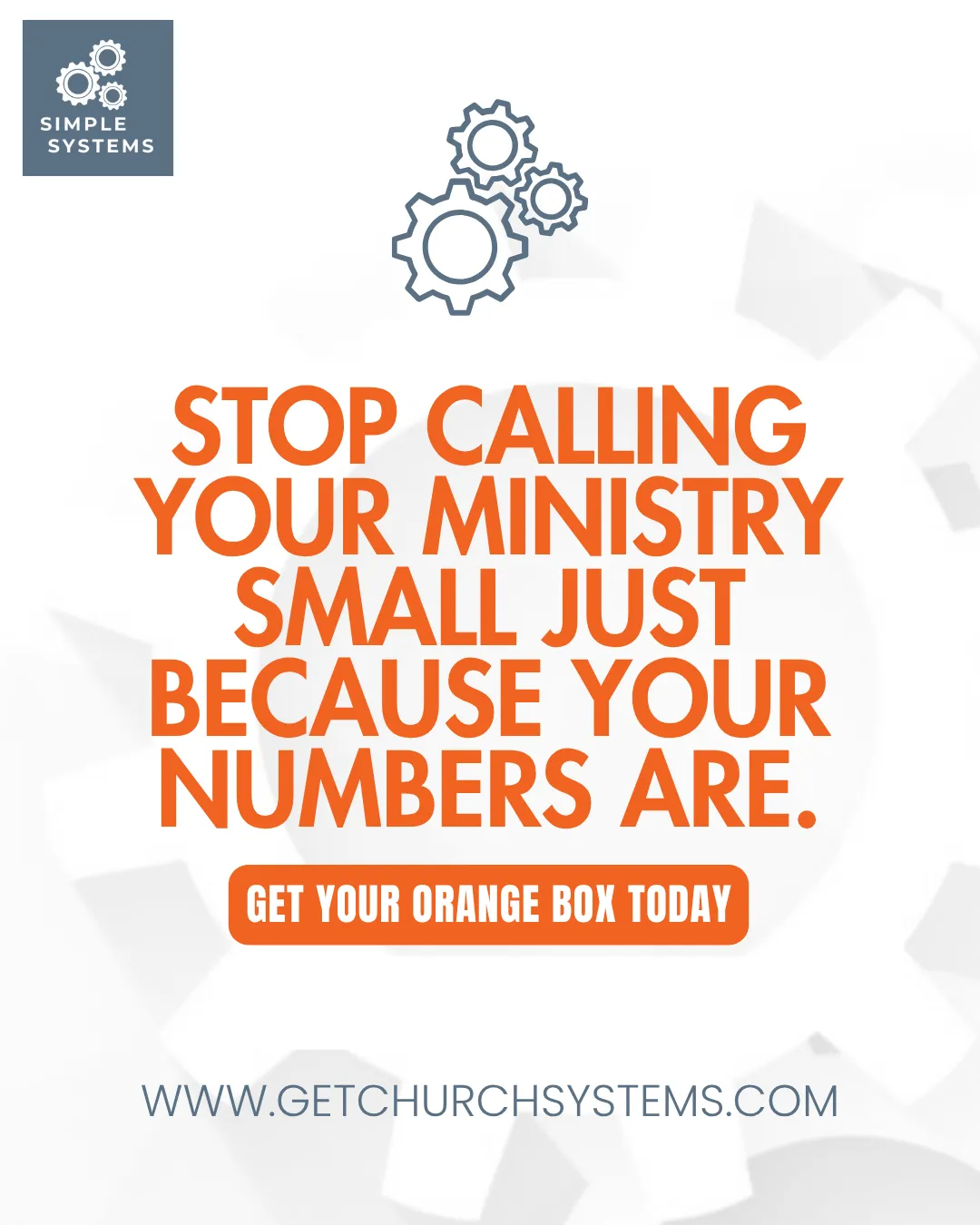
Small Is the New Mega: Why Microchurches Matter More Than You Think
Small Is the New Mega: Why Microchurches Matter More Than You Think
Pastor, let’s be real.
You love your people.
You preach your heart out.
But every time you scroll social media after church, it feels like everybody else is crushing it but you.
500 in attendance.
100 salvations.
A thousand on Easter.
And you’re sitting there thinking, “Lord… we had 23.”
If you’re not careful, that gap will eat at you.
Discouragement. Envy. Even that quiet resignation: Maybe I’ll never get there.
Here’s the truth I want to put in front of you:
Small is the new mega.
Micro in number. Mega in impact.
What if God isn’t asking you to chase somebody else’s standard?
What if He’s asking you to be faithful over a few (Luke 16:10) and let Him decide what “many” looks like?
This post is for the pastor of 10, 25, maybe 50 people.
You are not behind. You are early.
The Real Problem: Big Church Bias
Most of us were discipled into what I call big church bias.
Big church bias sounds like:
Attendance-based validation - “If the room is full, the work is blessed.”
Stage-based credibility - “If they have a big platform, they must know more than I do.”
Copy–paste ministry - “If I just do what that mega church does, I’ll get their results.”
But here’s what big church bias actually produces in a microchurch pastor:
Discouragement - You can’t even celebrate 5 new people because someone else just posted 500.
Envy - You’re loving people well, watching others play games with the gospel, and still “grow.”
Resignation -“I’ll never get there, so why try?”
And then we start doing dangerous stuff:
Signing big contracts with micro congregations.
Copying systems built for 1,000 people and trying to force them on 25 people.
Pushing leaders whose marriages and faith are barely holding at 30 in the room…
while praying, “Lord, send 150 in the next six months.”
That’s not faith.
That’s pressure built on someone else’s standard.
You don’t need a crowd.
You need capacity.
What Is a Microchurch (Really)?
Here’s the working definition from the episode:
A microchurch is a spiritual community of 10–50 people centered around worship, teaching, mission, and mutual care.
Micro in number.
Mega in impact.
Why microchurches are different (and powerful)
Highly relational
In a microchurch, people aren’t “the crowd.” They’re names.
They can talk to you after the service. You see their kids. You feel their pain.
That keeps your heart soft.Low overhead
Coffee shop. Library room. School. Living room.
You don’t need a 5-year lease to start obeying God.
Don’t sign contracts before you have commitments.High participation
In a microchurch, ministry doesn’t feel “professional only.”
One friendly deacon can own the door.
One faithful sister can lead worship with a track and a willing heart.
It’s not about polish. It’s about the purity of heart.Mission-focused, not event-focused
With 15–30 people, you can’t do 12 events a month, and that’s a blessing.
You’re forced to ask: “What actually moves the mission?”Culturally aligned
Our culture is hungry for authenticity and intimacy.
Not production. Not pretending.
Microchurches are built for that.Peaceful ministry
More people = more of everything:
More complaints. More crisis. More pressure.
A microchurch, led well, gives you space to pastor and love your family, guard your health, and be a human being.
You’re not “less than.”
You’re focused.
The 3 Systems That Make Micro Feel Mega
You don’t need a mega budget.
But you do need a few simple systems that stop the leaks.
At Simple Systems, we talk about 3 core systems:
Guest Follow-Up
Assimilation
Weekly Communications
Let’s keep it practical.
System 1 - Guest Follow-Up (So They Actually Come Back)
Quick win you can start this week:
Day 0 - Text before they leave: “Thanks for worshiping with us today. - Pastor”
Day 1 - Quick call or voice note: “How can I pray for you this week?”
Day 3 - Simple resource: a short clip or scripture that ties to Sunday.
Day 7 - Invite back: “We’d love to see you again this Sunday.”
You don’t need a CRM to do that with 1–2 guests a month.
You just need a repeatable pattern.
That’s a system.
System 2 - Assimilation (From Attender to Family)
Quick win:
Create a simple, clear path like:
Visit - Conversation - Coffee - Commit
After 2–3 visits, invite them to a coffee or lunch.
Share your story, your church’s story, and a next step:
“Here’s how you can belong and serve with us.”
Write that path down. Treat it like a playbook. Do it every time.
System 3 - Weekly Communications (So Your 25 Feel Like 250)
Quick win:
Send one weekly message to your whole church:
What we’re teaching this Sunday
One story (big or small) of God at work
One clear next step (serve, give, invite, group)
That can be:
A text broadcast
A simple email
A WhatsApp / GroupMe message
Microchurches win when people know what’s happening and feel connected.
If you want plug-and-play templates for all three systems, that’s exactly what’s inside Church Systems in a Box - CSB_LINK
A 90-Day Sprint to Build Capacity (P3 Framework)
Remember: you don’t need a crowd. You need capacity.
That’s where Henry’s P3 framework comes in:
Playbook
Players
Performance
Playbook - “Here’s How We Do It Here”
Write down how you do the basics:
How do we welcome people
How do we follow up
How do we pray for needs
How do we serve the community
Quick win:
Spend one hour a week for 90 days writing one simple playbook at a time.
Players - “Every Believer Is a Leader”
In a microchurch, you don’t have room for spectators.
Invite your people to step in: “If you’re here, you have a role.”
Start with 3–5 key roles: host, follow-up, worship, kids, outreach.
Don’t wait for “perfect.” Look for a willing heart.
Performance - “What Gets Measured, Grows”
Not fancy dashboards. Just clarity.
Track 4–5 simple metrics each week:
How many guests?
How many follow-ups were actually completed?
How many people are serving?
How many households are served in the community?
How many people are in a discipleship environment?
Run that as a 90-day sprint.
You’ll be shocked at how much your capacity grows, even if your attendance does not explode overnight.
If you want help walking out a 90-day sprint with accountability and done-with-you support, that’s what the Church Growth Accelerator is built for - ACCEL_LINK
Small Win Story: Peaceful Ministry in a Microchurch
One of the churches Henry works with here in Alabama has spent most of its life under 10 people.
By big church standards, they’re “tiny.”
By kingdom standards, they are mighty.
Here’s what they’ve done from day one:
Monthly grocery giveaways to families in need
School supplies for kids in their neighborhood
Consistent, simple worship gatherings… even when it was just a handful
No LED wall. No smoke. No 12-piece band.
But the city knows: “If we need prayer or practical help, we can call them.”
That’s peaceful ministry.
That’s micro in number, mega in impact.
And as they stay faithful, new people are starting to come—not because they chased big, but because they chose to be effective.
How to Lead a Microchurch with Power
Here’s the quick playbook from the episode.
1. Shift Your Mindset: You’re Not Less. You’re Focused.
Stop apologizing for being small.
Stop apologizing to other pastors.
Stop apologizing to your members.
Stop apologizing to yourself.
You are not “less than.”
You are assigned.
2. Focus on Formation, Not Performance
Jesus changed the world with 12.
He had 72. He preached to crowds. But He poured His life into 12.
What if your greatest fruit won’t come from preaching to 300…
But from going all-in on the 25 you have now?
Less energy on “How do we look?”
More energy on “Who are they becoming?”
“Where there is no vision, the people perish…” (Prov 29:18)
Give your microchurch a clear vision of who they can become together.
3. Equip Your People to Lead
In Henry’s first plant, they used to say:
“Every believer is a leader.”
You can borrow that line.
Invite newcomers into leadership environments early.
Call them up before you think they’re “ready.”
Train them as you go.
You don’t have to hand them a mic on day one.
But you can give them a role.
4. Create Rhythms of Gathering (Beyond Sunday)
Yes, gather for worship.
But in a microchurch, non-church gatherings are your secret weapon:
Game nights
Backyard BBQ
Coffee meetups
Serving together in the community
When people actually know and love each other outside of Sunday, a few things happen:
Your teams trust each other more
People give and serve differently
Your church becomes hard to walk away from
Honestly? If you do this too well, you might not stay “micro” forever.
5. Stay Connected to a Bigger Vision
Micro doesn’t mean isolated.
You need:
Peers who get your reality (bivocational, small town, under 100).
Mentors who remember what it’s like to lead 30, not just 3,000.
A community where your whole team can grow, not just you.
That’s why we built Church Systems in a Box, to give micro and small church pastors a place to:
Learn simple systems
Get coaching
Walk with other leaders in the same lane
You shouldn’t have to keep going to conferences where 95% of the room can’t use what’s being taught.
Next Step: Stop Chasing Big. Start Becoming Effective.
If you’ve got 10, 25, or 50 people…
You are not behind.
You are not failing.
You are not “less than.”
You are a microchurch pastor in a moment where God is raising up the remnant—in living rooms, coffee shops, school cafeterias, Zoom calls, and little brick buildings that never make Instagram.
So here’s the charge:
Stop chasing big.
Start chasing effectively.
Be faithful over the few God has already entrusted you with.
If you’re ready for some help with that, here’s your path:
Learn the simple systems that stop the leaks
Build your next 90-day sprint
Grow your capacity without losing your peace
Are you ready to stop the leaks in 90 days? Save your seat - WEBINAR_LINK
DIY pace ($997/year, 14-day refund, BNPL often ≈ $97/mo, subject to approval) - CSB_LINK
Done-With-You speed (90 days, $7,500, with flexible plans like $2,750×3 or $1,450×6) - ACCEL_LINK
Book Henry
Ready to take your church to the next level? Let's talk about your specific challenges and goals.

Henry Tolbert
Henry Tolbert is a church growth strategist who's helped over 1,000 pastors implement systems that scale. With 15+ years of ministry experience, he specializes in helping churches break through growth barriers without burning out their leadership teams.
Get 1 Growth Tip Every Monday
Join thousands of church leaders who start their week with actionable growth strategies

Simple Systems
Helping church leaders build, grow, and sustain impactful ministries through proven systems and strategies.
Products
Company
Support

Simple Systems
Helping church leaders build, grow, and sustain impactful ministries through proven systems and strategies.

Facebook
Youtube
TikTok